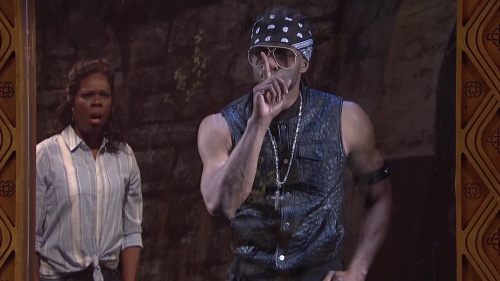21 BRIDGES Review: A Few Bad Apples
21 Bridges is so close to being a good movie that it is actively frustrating how wholly it misses the mark. It wants to be a Big Issue movie hiding in the guise of a police actioner, but while the action is occasionally engaging and inventively staged, the film is so muddled and noncommittal in its central thematic premise that it becomes annoying to parse and untangle. But even worse, that just makes the film boring, as it presents the mere sketch of a premise that favors predictable plotting over character or depth.
Chadwick Boseman plays Andre Davis, a New York detective whose father died in the line of duty when Andre was thirteen. This has instilled in him a sense of duty that apparently makes him an absolute investigative genius, though his prophetic powers are only one overproduced montage short of the implausible deductions from Sherlock. He’s also apparently a very trigger happy cop, as we’re told in a prologued Internal Affairs meeting, though the events of the film run entirely counter to that characterization, which is never adequately explored. Andre's ambiguously-defined detective skills are tested when a late-night cocaine robbery goes wrong, leaving a pile of dead cops in the perpetrators’ wake. Andre’s solution: close off all twenty-one bridges going in and out of Manhattan until 5 AM, giving police about four hours to track down the cop killers before the city wakes up.
Despite positioning Andre as the main character, he’s easily the least interesting and most underwritten part of 21 Bridges. Far more interesting are Stephan James and Taylor Kitsch as the pair of ex-military robbers suddenly in way over their heads, and the film’s B-plot revolves around their attempts at escape and an exploration of the criminal underworld that may enable them to do so. Unfortunately, this subplot really only exists to pad time until the cops-and-robbers game serves up a weak conclusion to Andre’s nearly non-existent character arc, and the film doesn’t really have anything substantive to say about the circumstances that led these criminals to where they are now, even though it desperately fumbles with making parallels between their military training and the police’s tactics against them.
This is where those murky themes come into play. 21 Bridges conflates the issues of police corruption and police militarization to try to create a social commentary of the state of urban policing. The corruption theme is delivered with such unsubtlety that I hesitate to say it qualifies as foreshadowing, as cops are constantly shown to shoot first and ask questions later, even when taking witnesses alive would help catch their targets. But the film stops just short of labeling this as an institutional issue, which isn’t a problem in and of itself, but the film’s allusions to the police department’s militaristic, martial law tactics run entirely counter to the idea that there are only a few bad apples on the force, and any moralistic consistency completely falls apart once you remember that the greatest overreach of police power was the inciting idea of the film’s protagonist. This leaves the film as a tangled mess of half-formed ideas that are supposed to develop a lead character too thin to support their complexity.
If you wanted to turn your brain off and simply watch 21 Bridges as a police procedural, you could probably do a lot worse. The gunfights are dynamically staged, even if its chase scenes are often underlit and confusingly edited, and there’s just enough criminal-underworld worldbuilding to pique a flicker of interest. But if you’ve seen a criminal pursuit movie before, the twists and turns of this one are so obvious that they give way to boredom without the necessary character work to make you forget the formula, which leaves you little choice but to contemplate the confused message the film fails to convey. And frankly, this is too dumb a movie for which to devote that many brain cells.


